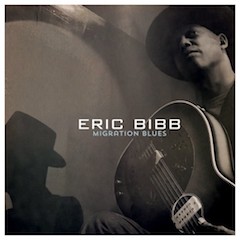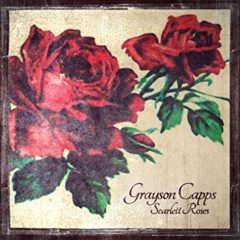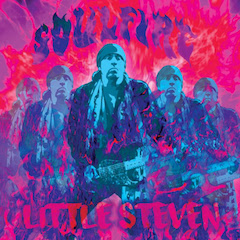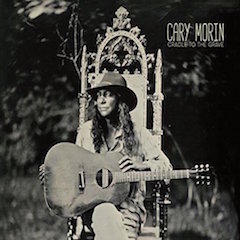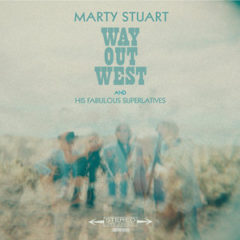
Eric Bibb: In Migration Blues he makes the most important music of his distinguished career… (Photo: Patricia de Gorostarzu)
In keeping with the Deep Roots tradition of selecting multiple Albums of the Year from the many genres we cover, the 2017 honorees are rootsy but suitably diverse in their sound signatures and influences. In the cases of the masterful southern singer-songwriter Grayson Capps and the master of rock ‘n’ soul Little Steven, their albums represent a return to the active ranks of recording after absences of six years and near-two decades’ duration, respectively, and it’s like they never left. Or maybe it would be better to say they left, then came back better than ever, which would be the more accurate assessment. Eric Bibb has been making the best music of his long, distinguished career in recent years, but in Migration Blues he’s made his most important music as well. On first listen we knew Bibb had sewed up a spot in this album hierarchy. Marty Stuart continued on his unpredictable trajectory with the challenging Way Out West, wherein he is theoretically inspired by the sounds of California country, pop and rock but puts all those elements together in epic fashion. Speaking of unpredictable trajectories, Lee Ann Womack returned to her native Texas and went deeply interior to reinvent herself with the intimate confessions of The Lonely, The Lonesome & The Gone, an unforgettable album no one but no one saw coming. Not least of all, Cary Morin completed his trilogy of acoustic fingerpicking albums with his finest effort yet, Cradle to The Grave, wherein the Crow tribesman sounds close not only to a panoply of blues sources but also to the earth itself—a magnificent, deeply layered triumph, and well deserved. And for those who share our affection for choral music of spiritual and secular kinds alike, there was no better recording of same in 2017 than Richard Harvey‘s Kyrie, with the voices of the Latvian Radio Choir and Estonian Philharmonic Chamber Choir in towering efforts on 11 Harvey compositions, all captivating and moving. A British TV and film composer, Harvey is best known for his Kyrie for the Magdalene written for The Da Vinci Code and later serving as the springboard for his new batch of haunting songs.
Links at the bottom of the page will send you to this year’s selections of The Elite Half-Hundred of 2017. These represent our top 50 albums of the year apart from the Album of the Year honorees. Owing to the number of genres we cover, these worthy discs range from blues to gospel (it was an especially fertile year for gospel, despite the mainstream press continuing to overlook it) to blues to classical to world music to folk to traditional rock ‘n’ soul. As we were putting this massive feature together and double checking the videos to be sure everything worked, we were struck by what a great playlist these varied tunes would be. Hint, hint to our readers.
We would be remiss in failing to thank the artists represented here for the wonderful, often enlightening musical experiences they gave us in 2017. Our only regret is that we could not cover more releases. But we do feel we’ve lived up to our mission to recognize outstanding music and musicians by and large ignored by the mainstream music press. We continue to provide this service for free (and no one at Deep Roots is paid either) and, as we approach 10 years of publishing this coming April, we are keeping the faith. Thank you for hanging with us, especially late this past year when we were disabled by some malicious hacking attacks. We’re back, baby! –David McGee
Note: Owing to the hacking Deep Roots experienced near the end of 2017 some of the selections in both Albums of the Year and our Elite Half-Hundred of 2017 are reviewed here for the first time. In other cases we provide an excerpt of and link to the full reviews published in Deep Roots.
***
ERIC BIBB, Migration Blues (Stony Plain Records)
Eric Bibb’s career spans five decades and 37 albums. During that time this son of folk singing activist Leon Bibb and nephew of the Modern Jazz Quartet’s towering composer/pianist John Lewis; who in his formative youth gained much in the way of perspective of the musical and social sort from Bibb household guests such as Odetta, Pete Seeger and Paul Robeson; who moved to Europe in 1970 and still lives in Sweden, where he’s gained perhaps a deeper perspective on his native land than he might have had he stayed here all those years…during this passage of years and social movements and shifting political sands, Eric Bibb has become an ambassador without portfolio for an America he wants to be better. Expat though he may be, Bibb operates from a position of reminding America to keep fighting for what’s right on a purely human level. Politics complicates this position, especially now with, at best, a crook in the White House who is frighteningly oblivious to history. This Eric Bibb, who will turn 66 this coming August, has in the past few years made the best music of his life, and in his new Migration Blues he has also made the most important music of his life. Complete review here…

Eric Bibb discusses his life, travels and Migration Blues

‘Refugee Moan,’ Eric Bibb, from Migration Blues
***
GRAYSON CAPPS, Scarlett Roses (Royal Potato Family)
Orpheus, Don’t Look Back
By David McGee
Somewhere during the 13-minutes-plus elapsing from the time of the assertive solo acoustic guitar strumming opening “Scarlet Roses,” on through the slinky lustiness of “Hold Me Darlin’,” to the dispassionately rendered dystopian images of lives in disrepair in the talking blues of “Bag of Weed,” I began to hear Scarlett Roses, Grayson Capps’s first solo album in six years, as a Southern Gothic journey into an underworld of his own creation, and him as a modern-day Orpheus attempting to recover and restore to life not his dead wife, as the Orpheus of Greek mythology tried and failed at, but rather his own peace of mind. Scarlett Roses is an epic vision of life, love and struggle in the here and now, Capps’s own version of the legendary Orphic Hymns, divine music to charm all living things. It is some kind of masterpiece.
Here he imparts hard-won lessons, revealing at the outset, in the title track, “if I don’t go crazy/I believe I’ll go insane.” Tellingly, “Hold Me, Darlin,’” for all its sensuousness and heat, opens in a ghostly haze, with a distant electric guitar entering deliberately with a rollin’ and tumblin’ figure before Russ Broussard’s drums kick in and Capps ignites the action with a charm offensive aimed at securing extracurricular activities with a possibly reluctant object of his affections. Multi-instrumentalist Corky Hughes cuts loose midway on wild, howling lap steel solo as Capps stays close to the melody line on his own guitar underneath it all, and when Capps returns with a lyrical flight of fancy (“Hold me like an old wisteria vine/hangin’ on to that old Alabama pine”) the mood is light and carefree in stark contrast to the song’s mysterious fade-in from…where? One song later, “Bag of Weed,” and we find he’s “out in the woods, past the cypress grove/when I’m comin’ back, baby I don’t know.” While traveling through his self-made underworld, he observes a friend’s house burned to the ground; a lowlands pond all dried out; a friend happy to be a hermit, passing his life painting and letting you “think the things you gonna think”; a kid who steals a car, totals it and now lets it sit in his yard, where it “stands as a statue to a young man’s game,” and so on. Periodically he steps outside the narrative, like a chicken-fried Rod Serling, with philosophical marginalia, such as the recondite (to whom it’s addressed is never revealed), “You hurt me good, you hurt me hard/I never thought you’d go that far/love’s alive like gasoline/it might burn messy, it might burn clean”; or the confessional, “I ain’t pointin’ no fingers/I can identify with a selfish man and his ability to lie/but the cold hard truth, like a hammer in the teeth/hurts like hell and don’t give you no peace…”; or the piercing, observed with unnerving calm: “ain’t it funny how this life can bring you to your knees.” As the song title suggests, various intoxicants get him through this journey but those are as much metaphorical as literal—like Lebowski’s rug, they tie the room together. And the room is in Capps’s head. That a smattering of applause inexplicably breaks out at points, deep in the mix but more pronounced at the end, adds to the surreal landscape Capps has fleshed out: is this Greek chorus intended to be mocking or exultant?

‘Bag of Weed,’ Grayson Capps, from Scarlett Roses

‘New Again,’ Grayson Capps, from Scarlett Roses
In this context the fourth song, tellingly titled “You Can’t Turn Around,” is a huge cathartic moment, a full-on rock ‘n’ roll workout centered on the idea of, essentially, you can’t always get what you want, but you might find you get what you need. It’s jump started by Hughes’s howling, rambunctious guitar solo, and Capps sings it free spiritedly, indulging in the liberation it celebrates. And whereas Orpheus, disdaining the command of Hades and Persephone, looked back at his wife and lost her forever to the Underworld, from Capps we learn loves lives anew in the greasy, jubilant grind of “Thankful” (I could imagine Gregg Allman, may he rest in peace, doing serious justice to this tune), sequenced as if it’s a corollary to “You Can’t Turn Around.”

‘Moving On,’ Grayson Capps, from Scarlett Roses
These songs are the heart of the matter. The final four tunes form an extended epilogue. Swathed in layers of Daniel Lanois-like mysterioso, otherworldly guitar flourishes and folky harmonica, “New Again” and the big finish, “Moving On”—dead giveaway titles, these—find Capps emerging from the maelstrom with renewed purpose and clear vision, declaring “only from the dark can you see the light” and “ain’t no use for mourning what has been” (from “New Again”) and “shelter me, my darlin’, let me come inside/it’s love we’re borrowing/until the day we die” and “we played in the market, and we played in town/we ain’t gonna be here long/they’ll make us their target if we stick around/it’s time we be moving on” (from “Moving On”). This is not to discount the punch of “Hit Em Up Julie” in all its hill country blues authority and the seething nightmare dreamscape of “Taos,” mind you, but those are interesting detours off the main road. (A word here about the whole album’s compelling sonic backdrop. Capps and Hughes are credited as producers along with Capps’s wife, Trina Shoemaker, who happens to be the first female to win a GRAMMY for engineering. Everything Ms. Shoemaker touches has a certain je ne sais quois, a distinct voice of its own, a sure sense of framing stories and music for the most soulful outcome possible. Let us not discount her influence on the shape of things presented here.)
A mainstay of the Mobile, Alabama, scene, Grayson Capps has now outpaced his Gulf Shores competitors and vaulted himself into the front ranks of America’s finest singer-songwriters. On Scarlett Roses, his divine music, like Orpheus’s, should charm all living things save those with souls so dead as to be deaf to its truth. He’s not looking back.
***
LITTLE STEVEN, Soulfire (Wicked Cool/Big Machine/Ume)
I am moved to recount this indelible moment by a complete immersion in Little Steven (Van Zandt)’s new solo album, his first in almost two decades, called, appropriately enough, Soulfire. This—the best rock ‘n’ soul album of 2017 by far (other rockers aren’t even playing the same sport)—is Steven reclaiming something essential about and for himself, and the proof of this is in the sheer intensity he brings to his music here; even the few quieter moments are fraught with tension born of a need for unequivocal self definition. In an April press release announcing the album, Van Zandt admits as much, saying he “felt a bit guilty about having walked away from Little Steven the artist. I left that part of myself behind and I shouldn’t have done that. I let the material down by not continuing to perform it. I betrayed the work and I want to fix that. I didn’t give up on the material–there were a lot of other factors–but I do have a sense of wanting some redemption for it.” Complete review here…

‘Soulfire,’ Little Steven, from Soulfire
***
RICHARD HARVEY (WITH THE LATVIAN RADIO CHOIR, ESTONIAN PHILHARMONIC CHAMBER CHOIR), Kyrie (Altus Records) (Review by Robert Hugill)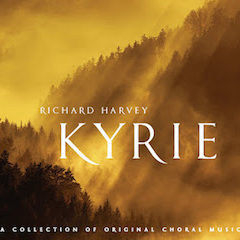
You have heard the music of Richard Harvey, even if the name does not mean anything to you. A British composer for film and TV, Harvey’s credits include the Kyrie for the Magdalene, which was used in the film of The Da Vinci Code and is the work informing the title track of Harvey’s new disc of choral music, Kyrie, on Altus Records. Recorded by the Latvian Radio Choir and Estonian Philharmonic Chamber Choir, with musicians from the Polish Radio Symphony Orchestra and Sinfonietta Riga conducted by Kaspars Putnins, Sigvards Klava, Tomasz Szymus and Richard Harvey.

‘O Be Joyful,’ Richard Harvey (with the Latvian Radio Choir, Estonian Philharmonic Chamber Choir), from Kyrie
The disc has eleven tracks and Harvey’s texts vary from his own, to Psalm 100, 12th century Latin, Shelly (Mutability), George MacDonald and Henry Neele. As might be expected given the choral forces involved, the performances are superb. Both choirs exhibit their famous combination of control, focus, line and elegant purity. They bring to the music a wonderful clarity and finely honed feel for the elegant lines of Harvey’s music. Complete review by Robert Hugill here…
***
CARY MORIN, Cradle to the Grave (Maple Street Music)
True to his Crow heritage, Cary Morin sounds like he’s close to the source of all things sacred: air, sky, land and water. His acoustic fingerpicking, devoid of sonic embellishments or any accompaniment save his husky, lived-in voice resonating with earthy warmth, rises up from sources such as Robert Johnson, Big Bill Broonzy, John Fahey, Mississippi Fred McDowell…that is to say, it’s deeply evocative of an historic sweep of American music.
He puts the voice and the guitar together powerfully here, close mic’d and immediate, on the third of an album series documenting his self-described “solo fingerstyle journey.” Purposefully, steadily fingerpicking the album opening title track, he strikes a telling theme at the song’s outset: Watch over me, I come down low/watch over me, for I’m only a child/never made my way in this world all alone/seek what I crave/yeah, life’s a short walk from the cradle to the grave…” The final track, titled “Watch Over Me,” is darker, more foreboding, and Morin’s voice has a heaviness absent from the opening cut, as he opens with a variation on the verse quoted above, to wit: Watch over me, come down low/watch over me, watch over me for I’m only a child/I’ll make my way in this world, plant a seed in the wild/watch over me, watch over me, for I’m only a child… Here his fingerpicking is more florid, more urgent, more telling of subtext than it was at the album’s start. The key sentiment he repeats, and repeats again, is I’m only a child. Complete review here…

‘Cradle to the Grave,’ Cary Morin, from Cradle to the Grave
***
MARTY STUART, Way Out West (Superlatone Records)
Cue up Way Out West and you find yourself suddenly amidst a swirling, unsettling wind as the distant sound of Native American voices chant over faint percussion and from a trebly guitar emanate ghostly entreaties. Forty-seven seconds into it, and it’s gone, supplanted by surging drums and chiming, reverbed guitar out of the “Apache” school (take your choice as to the source: The Shadows’ Hank Marvin, or the Dutch guitar master Jørgen Ingmann), but the instrumental itself unfolds with mystery and grandeur—it evokes something unknown and unknowable even as it elevates to heroic heights, like Jack Nitzsche’s “The Lonely Surfer.”
Yes, this is a Marty Stuart album, theoretically inspired by the sounds of California country, pop and rock. Herein this guitar-driven epic offers profound echoes of (according to a list I compiled while listening multiple times) Dick Dale, Duane Eddy, Link Wray, Jack Nitzsche, Don Rich, Hank Garland, Hank Marvin, Marty Robbins, Johnny Cash, Dwight Yoakam and Pete Anderson, and, on the glorious, howling, churning instrumental titled “Quicksand,” a blessedly perverse triumvirate of Dick Dale meets Link Wray meets the unhinged Joe Meek. Along the way you’ll encounter pills of all colors; an ode to the glories of old-time air mail delivery (“Air Mail Special,” complete with some breathtaking speed picking courtesy guitarists Mike Campbell and Stuart himself, solo and in a wild tandem set-to towards the end); and a shifting timeframe, like a French New Wave film, that will set you down one minute in Old Mexico (as in the tense outlaw ballad “Old Mexico,” possibly a nod to Robbins’s classic Gunfighter Ballads & Trail Songs and in and of itself a seeming sequel to the cut preceding it in the sequence, the foreboding instrumental “El Fantasma Del Toro,” a spooky mélange of gentle Spanish guitar, understated percussion and softly crying steel); with a trucker big rigging it “out in the middle of nowhere/driving through a night as black as coal” in the stomping “Whole Lotta Highway (With a Million Miles to Go)”; caught up in a rocking, self-actualizing desert moment in the ceaseless assault that is “Time Don’t Wait” (“the wind did seem to say/don’t put off ‘til tomorrow/what you can do today/’cause time don’t wait on nobody/time don’t wait on nobody/time don’t wait on nobody/it just keeps moving on…”) with its delightful, central driving force being a recurring Rickenbacker guitar riff appropriated from The Byrds’ “I’ll Feel a Whole Lot Better.” Complete review here…
![Deep Roots Albums of the Year, 2017 16 Marty Stuart - Time Don't Wait [Official Video]](https://i.ytimg.com/vi/IS7xPPcR4Bc/hqdefault.jpg)
‘Time Don’t Wait,’ Marty Stuart, official video from Way Out West
***
LEE ANN WOMACK, The Lonely, The Lonesome & The Gone (ATO Records)
Seeking something she had lost along the way to country stardom, Lee Ann Womack returned to her native Texas, to the studio where Willie Nelson cut “Night Life” and George Jones recorded a 1959 classic, “Take the Devil Out of Me.” Assembling a basic backing band, she went deeply interior and essentially reinvented herself. Sonically captivating in noir fashion with ghostly slide and pedal steel cries, subdued percussion and mournful acoustic and electric guitars, Womack sounds aching, deeply wounded, and mesmerizing in the starkness of her confessions. By turns country and bluesy with a gentle swing and occasional spectral background voices, the otherworldly ambiance supporting Womack’s measured readings renders this more like a collection of art songs. Oh, she lets her emotions loose now and then (on the celebratory “End of the End of the World,” for example, marking a welcomed reunion with a wayward lover, and on the vocal and rockabilly guitar workout on her version of “Take the Devil Out of Me”) but the ominous blues of “All the Trouble” and the abject desolation of “Someone Else’s Heartache” are more representative of a most unusual, unexpected detour. David McGee

“All the Trouble,’ Lee Ann Womack, from The Lonely, The Lonesome & The Gone

